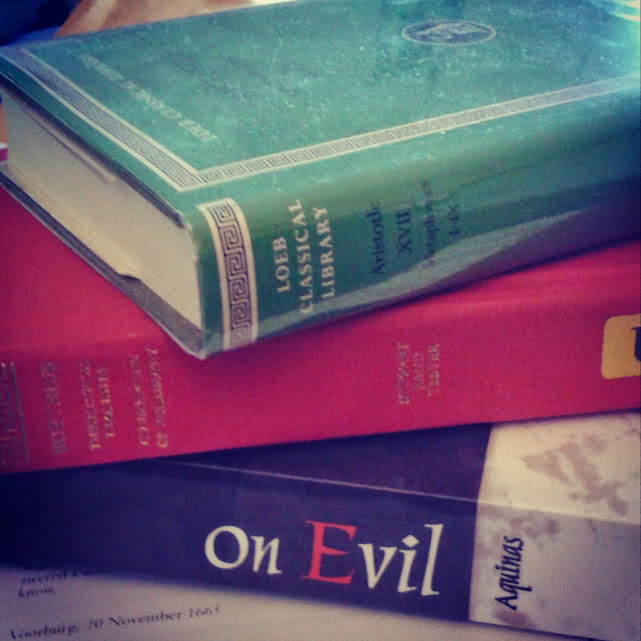When you are living in poverty you live in a world of subsistence. You live from paycheck to paycheck (and sometimes not even from paycheck to paycheck), but that's not the only way in which you subsist. You get yourself into the mindset that time is worth more than the material goods of the world.
After all, what are "things"? You can't take them
with you. Better to store up your treasures in heaven than here on earth where
the proverbial moth and worm can eat them away. And that's all true.
But does this affect the way that you live in other ways? I
think it does. After all, what you are cultivating is a habit - a habit of
good-enough-ness, of mediocrity.
Virtue is defined roughly as the mean between excess and
deficiency and many people take that to mean that you want to have just enough
- not too much and not too little. But a mean is sometimes closer to one end of
that continuum than the other.
Courage, for example, is much closer to rashness than to
cowardice. What I have found in my own life is that that continuum is really
much more like a circle than a line. Excess and deficiency are sometimes so
tangled up in one another that it's hard to know where one ends and the other
begins.
Really, that's a pretty Aristotelian idea, I suppose: excess
and deficiency are both vices. To show how this works, let me share a story. (This is autobiographical and those of you who have been poor may recognize
this)
The parent-child relationship took precedence over the material goods, and that's good, because I have, in some sense, demonstrated how much my child means to me. Right?
Wrong, because, in the process of providing momentary happiness for my child (because I know that gift will break or wear out), I have also demonstrated how little I consider his overall well-being.
First of all, I neglected to put his needs for shelter and heat first. Secondly, the fact that I had to deal with the stress of not having paid a crucial bill (or even a non-critical one) weighed on me, even though I was unaware of how much it affected me. It affected the way that I parented - I was stressed so I was crabby and depressed which put me out of touch with my child. Thirdly, it showed my child that things are the way in which we demonstrate love.
This is how excess and deficiency co-exist in poverty. It's
not as simple as "Oh, there just simply isn't enough money." It's
also, "There's never enough money and I want more."
Slipping from the deficiency of poverty into the excesses of
avarice and gluttony is an easy thing to do. And it's a cruel trick that Satan
plays - the deficiency feeds the sin and the sin feeds the deficiency. By
playing the game, we habituate ourselves to this lifestyle of subsistence where
the question is not "How do I live a better life?" but "How much
do I need to get by?" By focusing on the lowest point, we aim for the
minimum and achieve mediocrity. And because it's a habit, we tend to stay
there.
So, at this moment, I am 8 weeks away from graduation. I
have done well. I am a good scholar and will make a fine employee somewhere.
I'd like to go to Grad School and get my MA in Philosophy (well, if we're
aiming high, I'd like my Ph.D. - but that's truly a pipe dream). The reality of
financing it, however, is not so easy. As a woman in my mid-forties, there will
not be enough time to pay back the loans I'd have to take out, and the job
market is not particularly favorable for Philosophy professors.
As I search for a job, I have been looking for jobs I could
fill without too much trouble. The goal, of course, is to get hired so that I
can go to school and have it paid for. But, rather than aiming for the top of
my skill set, I have been aiming at the bottom, or, optomistically, the middle.
I just want a job - any job - just enough to get by.
I was on my way home this morning when I realized what I was
doing.
I am living out the same subsistence habit I developed as a
parent. I have fought to be the best in my studies. I have written from the
heart and become a better person for it. I have worked to change my life and
renovate my ideas. I have wrestled with my Faith and come out stronger in my
love for God than I was before, yet, I still don't trust myself.
That has to change. And it has to change now.
It is important to realize that while God doesn't want me to
put material possessions before my relationships, some of those material needs
are essential to raising a healthy family. Not everyone is called to a life of
poverty, just like not everyone is called to a life of wealth (and,
consequently, responsibility). But, just like the parable of the talents tells
us, those who squander their opportunities will have what little they get taken
from them and given to another.
God has given me opportunities and talents and I have to trust Him (and
myself) to make the most of them. It's a scary ride, friends. It takes courage
to step outside of what you know, to believe that you really could succeed, to
believe that God has something for you that is bigger than you can imagine and
you really can do it.

No comments:
Post a Comment